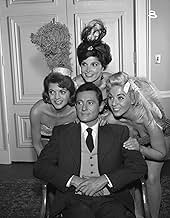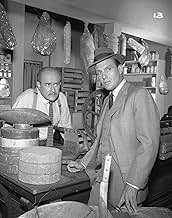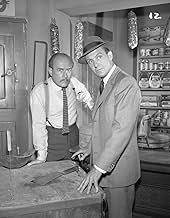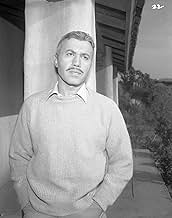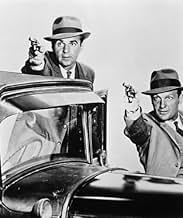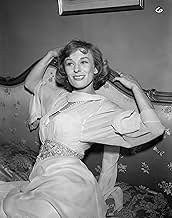VALUTAZIONE IMDb
8,0/10
3290
LA TUA VALUTAZIONE
Segui l'agente speciale Eliot Ness e la sua squadra d'élite di agenti incorruttibili che combattono il crimine organizzato a Chicago negli anni '30.Segui l'agente speciale Eliot Ness e la sua squadra d'élite di agenti incorruttibili che combattono il crimine organizzato a Chicago negli anni '30.Segui l'agente speciale Eliot Ness e la sua squadra d'élite di agenti incorruttibili che combattono il crimine organizzato a Chicago negli anni '30.
- Vincitore di 2 Primetime Emmy
- 4 vittorie e 7 candidature totali
Sfoglia gli episodi
Recensioni in evidenza
This show's concept was hastily developed to become a one-hour weekly dramatic series after the success of the beautifully produced made-for-television movie "The Scarface Mob". At first, the producers tried filming the capture of other important criminals using Eliot Ness, the TV-film's fictionalized real-life hero, as their central character. Then they designed a unit like the 1930s "Untouchables" squad depicted in the TV-movie, a federal group combating gang activity and other crimes in Chicago, one headed by Ness (Robert Stack) who worked out of an office in the city. He had six men, with Martin Flaherty (Jerry Paris), Jack Rossman, (Steve London), Enrico Rossi (Nicholas Georgiade), Lamarr Kane (Chuck Hicks) and William Youngfellow (Abel Fernandez) as its mainstays. In the second year, Paris left to be replaced by Lee Hobson (Paul Picerni) for the remainder of the series' run, and Cam Allison (Anthony George) was added for that year only. It was also decided that Frank Nitti (Bruce Gordon) and other mob bosses would be used as the main scheming villains without a regular "Al Capone" being portrayed. Nitti was killed off four times during the series, but Gordon was so popular with the show's watchers he was resurrected each time. A stable of regular police and ganglord types was also developed, played by Oscar Beregi, Joseph Ruskin, Frank Willcox, and Nehemiah Persoff with regular police and useful guest stars being hired a number of times. As Robert Stack had feared from the beginning, the show tended to marginalize the role of the ethical Ness in favor of unglamorously and dramatically portraying the activities of the victims, criminals, or crimelords of the week. The use of a narrator, radio commentator Walter Winchell, helped to keep the ethical view uppermost in observers' minds; and frequently, Ness and his squad were able to get across the desirability of cooperating with police, as this idea finally sank in. Outside agents played by John Gabriel, Jack Lord and others were sometimes used to improve a script. But from the first, the show's outstanding quality was the abilities of writers, directors and guest actors to produce powerful hour-long series. "The Petrone Story", "The Rusty Heller Story", "Cooker in the Sky", "Ginger Jake" and a hundred others may have occasionally overdone graphic detail and use of machine guns, but they were often brilliantly cinematic. The list of directors who toiled for the series included 29 first-raters including Ida Lupino, Tay Garnett, Vincent McEveety, Paul Wendkos, Richard Whorf, Walter Grauman and Bernard L. Kowalsi among others. The writers' list included 40 names, many illustrious, such as Robert C. Dennis, David P. Harmon, Ernest Kinoy, Harry Kronman, John Mantley, Gilbert Ralston, Sy Salkowutz, Alvin Sapinsley, George Slavin, William Templeton. Guest stars such as Patricia Neal, Elizabeth Montgomery, Lee Marvin, Arlene Martel, Will Kuluva, Dolores Dorn-Heft, Robert Middleton, Ruth Roman, Brian Keith, William Bendix, Barbara Stanwyck and Joe de Santis were always an extra cause to tune in to the latest adventure. In the last year, producer Quinn Martin bowed to pressure groups and tried to replace Italian surnamed villains with others; but the top-ranked series was canceled after 4 unforgettable years. To measure the quality of "The Untouchables" against most other series is impossible; its scenes have far more power than those of almost any other series; It was not always ethical fiction; but the series always had first-rate production qualities, acting, writing and directing. It holds a very high place in U.S. film history.
I had never heard of "The Untouchables" TV show until one morning
my 8th grade English teacher, Mr. Schmidt started ranting about the
graphic violence depicted in movies and on television shows such as
"The Untouchables" and what was he world coming to? From the next
broadcast, I was an avid fan. Much as in the style of the James Cagney
classic of 1933, "Public Enemy," "The Untouchables" wove a web of
mysterious gangland horror by NOT showing the graphic violence but by
instead keeping the killing in the shadows. The creators of the series
never forgot that there is nothing you can show in theater that can
measure up to the imagination of the audience. Another mysterious dimension to the series is, like "The Alfred
Hitchcock Show", "The Untouchables" had an uncanny knack of featuring
actors who would later become stars or at least very well known faces
in movies and on television. After 4 years in the air force including
a year in Vietnam, I watched the series as daily re-runs during the
summer of 1971 just before going to university in Tokyo. One episode
had Telly Savalas as an up and coming bookkeeper with The Mob run by
Frank Nitty while Al Capone was in prison. That evening other business
pulled me away from the television set and I figured I'd see the second
half of the show some other time. Because I have been in Japan ever
since, I never did find out whatever happened to the character played
by Telly Savalas. Less than two years later, however, Telly Savalas
finally made it big in television as Kojak.
my 8th grade English teacher, Mr. Schmidt started ranting about the
graphic violence depicted in movies and on television shows such as
"The Untouchables" and what was he world coming to? From the next
broadcast, I was an avid fan. Much as in the style of the James Cagney
classic of 1933, "Public Enemy," "The Untouchables" wove a web of
mysterious gangland horror by NOT showing the graphic violence but by
instead keeping the killing in the shadows. The creators of the series
never forgot that there is nothing you can show in theater that can
measure up to the imagination of the audience. Another mysterious dimension to the series is, like "The Alfred
Hitchcock Show", "The Untouchables" had an uncanny knack of featuring
actors who would later become stars or at least very well known faces
in movies and on television. After 4 years in the air force including
a year in Vietnam, I watched the series as daily re-runs during the
summer of 1971 just before going to university in Tokyo. One episode
had Telly Savalas as an up and coming bookkeeper with The Mob run by
Frank Nitty while Al Capone was in prison. That evening other business
pulled me away from the television set and I figured I'd see the second
half of the show some other time. Because I have been in Japan ever
since, I never did find out whatever happened to the character played
by Telly Savalas. Less than two years later, however, Telly Savalas
finally made it big in television as Kojak.
I must differ only slightly from the praise of one who precedes me, but yes, it was a cracking good show! When a local station ran the series in syndication at midnight in 1967, I turned into an insomniac.
Part of it was my youth; part was/is the b&w presentation giving it a brooding, "gritty" (pardon the cliche) flavour; part was the musical score. Frankly, I found it much superior to the colour and more mature (?) series recently under the same title. Possibly the early '60s series had the elements of a morality play that move some part of me that the more ambiguous -- and in places historically accurate -- new UNTOUCHABLES can not.
One thing bothers me, however, although I fully understand that in the television productions of forty years ago one had to be discrete. It concerns the depictions of violence. I do not object (within reason) to violence per se, but THE UNTOUCHABLES showed a lot of it without the horror. With a more jaundiced eye of the 1990s, when on very rare occasions I have been able to see an old time episode, I am struck by the trivialisation of violent scenes. Even the point-blank firearms shots are comically muted, and there is never a hint of flying blood.
That said, however, I consider the advent of THE UNTOUCHABLES and BONANZA in the 1959-60 season as the beginning of the REAL "golden age of television" in the United States.
Post scriptum: I am sure there were a couple of spin-off "made for TV" movies in the 1960s from the series. Of that I know nothing more save the title of one of them: THE GUN OF ZANGARA.
Part of it was my youth; part was/is the b&w presentation giving it a brooding, "gritty" (pardon the cliche) flavour; part was the musical score. Frankly, I found it much superior to the colour and more mature (?) series recently under the same title. Possibly the early '60s series had the elements of a morality play that move some part of me that the more ambiguous -- and in places historically accurate -- new UNTOUCHABLES can not.
One thing bothers me, however, although I fully understand that in the television productions of forty years ago one had to be discrete. It concerns the depictions of violence. I do not object (within reason) to violence per se, but THE UNTOUCHABLES showed a lot of it without the horror. With a more jaundiced eye of the 1990s, when on very rare occasions I have been able to see an old time episode, I am struck by the trivialisation of violent scenes. Even the point-blank firearms shots are comically muted, and there is never a hint of flying blood.
That said, however, I consider the advent of THE UNTOUCHABLES and BONANZA in the 1959-60 season as the beginning of the REAL "golden age of television" in the United States.
Post scriptum: I am sure there were a couple of spin-off "made for TV" movies in the 1960s from the series. Of that I know nothing more save the title of one of them: THE GUN OF ZANGARA.
This was a one hour crime drama show shot in spartan black and white that lasted four seasons and supposedly followed the exploits of Elliott Ness (Robert Stack) and his Untouchables (unbribable) during their time in Chicago, 1931- 1933, although the details are very fictionalized.
It managed to stay interesting and creative by centering loosely on the criminal exploits of Al Capone and mainly Frank Nitti, played by Bruce Gordon throughout the series, but branching out to other Prohibition era criminals, often without the involvement of the Capone gang, and sometimes even without much mention of the Untouchables themselves. In fact, the Untouchables are often shown dealing with issues such as local murders that would be outside the purview of federal law enforcement and more in line with what the local police would have dealt with.
The guest stars are like a who's who of 1960s TV and even film - Elizabeth Montgomery, Lee Marvin, Cliff Robertson, Victor Buono, Rip Torn, Werner Klemperer, Brian Keith, etc. - as well as some veteran film stars such as William Bendix, Barbara Stanwyck, and J. Carroll Naish.
The show is episodic, skipping around in time, and it is interesting that with all of the talk of bringing criminals to justice that Ness ends up shooting it out with and ultimately killing almost all of the criminals at the end of the show. Either that or rival criminals ended up killing each other. The Department of Justice couldn't have been happy about that.
Ness died shortly before this series began, and it is ironic that the best days of his career were during his time with the Untouchables. Afterwards his life went on a downwards trajectory and included a couple of divorces, a failed election campaign for mayor of Cleveland, and failed business ventures. His time with the Untouchables largely forgotten by his death, this TV show resurrected interest in that period of history and thus that period of Ness' life.
It managed to stay interesting and creative by centering loosely on the criminal exploits of Al Capone and mainly Frank Nitti, played by Bruce Gordon throughout the series, but branching out to other Prohibition era criminals, often without the involvement of the Capone gang, and sometimes even without much mention of the Untouchables themselves. In fact, the Untouchables are often shown dealing with issues such as local murders that would be outside the purview of federal law enforcement and more in line with what the local police would have dealt with.
The guest stars are like a who's who of 1960s TV and even film - Elizabeth Montgomery, Lee Marvin, Cliff Robertson, Victor Buono, Rip Torn, Werner Klemperer, Brian Keith, etc. - as well as some veteran film stars such as William Bendix, Barbara Stanwyck, and J. Carroll Naish.
The show is episodic, skipping around in time, and it is interesting that with all of the talk of bringing criminals to justice that Ness ends up shooting it out with and ultimately killing almost all of the criminals at the end of the show. Either that or rival criminals ended up killing each other. The Department of Justice couldn't have been happy about that.
Ness died shortly before this series began, and it is ironic that the best days of his career were during his time with the Untouchables. Afterwards his life went on a downwards trajectory and included a couple of divorces, a failed election campaign for mayor of Cleveland, and failed business ventures. His time with the Untouchables largely forgotten by his death, this TV show resurrected interest in that period of history and thus that period of Ness' life.
I bought the first series of DVDs yesterday and until then, I never knew there was a two-hour pilot movie about it. I always thought Robert Stack was a better Eliot Ness than Kevin Costner. Stack's Ness was more like a tough, no-nonsense federal agent while Kevin Costner played him more like a nerdy accountant. This used to be my dad's favorite show and, on nights when I didn't have school the next day, he would let me stay up and watch it with him. When I was in college, I caught it when it was in syndication. I hope they continue to put out these DVDs until they have the whole series out. I'm really looking forward to it.
Life sure was simple back when this series first aired. You rooted for the good guys and hissed at the bad guys and you were glad, in the end, to see Capone and his cohorts get what was coming to them. It also shows that we have to be ever vigilant with our government officials so that this kind of evil cannot permeate our society. Great action-packed series and now lives forever in the DVD format. Now, if only THE FUGITIVE would come out on DVD.
Life sure was simple back when this series first aired. You rooted for the good guys and hissed at the bad guys and you were glad, in the end, to see Capone and his cohorts get what was coming to them. It also shows that we have to be ever vigilant with our government officials so that this kind of evil cannot permeate our society. Great action-packed series and now lives forever in the DVD format. Now, if only THE FUGITIVE would come out on DVD.
Lo sapevi?
- QuizWalter Winchell received a reported $25,000 per episode for his narration on this series. With his signature machine gun dialogue delivery, he could apparently rack up almost 200 words per minute.
- BlooperThe opening credits for the fourth season show a book open to a page that reads "The Untouchables, 1929--1933". This contradicts the chronology of several episodes set in 1934 or 1935.
- Citazioni
Police Officer: There is nothing in that area... except an old abandoned warehouse.
- ConnessioniEdited into FBI contro Al Capone (1959)
I più visti
Accedi per valutare e creare un elenco di titoli salvati per ottenere consigli personalizzati
- How many seasons does The Untouchables have?Powered by Alexa
Dettagli
- Data di uscita
- Paese di origine
- Lingua
- Celebre anche come
- The Untouchables
- Luoghi delle riprese
- Aziende produttrici
- Vedi altri crediti dell’azienda su IMDbPro
- Tempo di esecuzione
- 50min
- Colore
- Mix di suoni
- Proporzioni
- 4:3
Contribuisci a questa pagina
Suggerisci una modifica o aggiungi i contenuti mancanti


